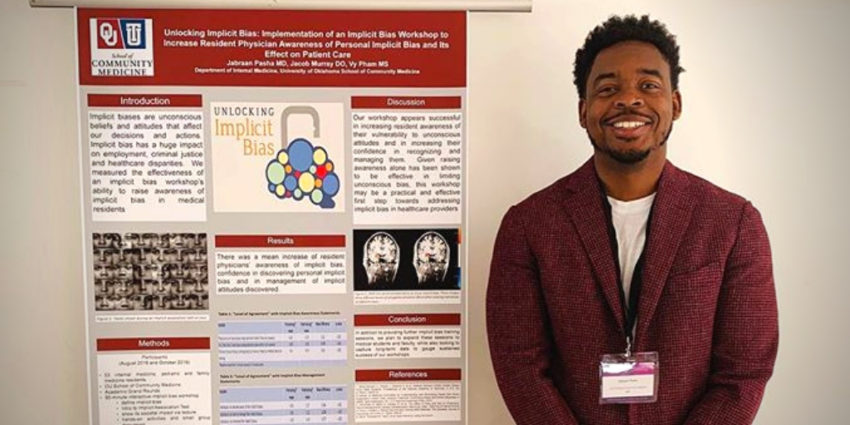
Share On Social!
In training, doctors and other healthcare providers are taught to disregard their own personal upbringings, and that of their patients, from clinical decisions.
But doctors are susceptible to their unconscious bias.
Dr. Jabraan Pasha is changing that.
Pasha created a workshop to spread awareness of implicit bias─the attitudes or stereotypes that affect our understanding, actions, and decisions unconsciously─in the healthcare system.
“The workshop aims to make us realize we are not bad people because of [implicit bias],” Pasha said. “We have these biases that are there. Agree or not they are there, and this can help people take steps to correct it.”
“It’s important to remove shame and guilt.”
Pasha’s Discovery of Implicit Bias
Pasha, a native of Tulsa, Okla., has been around the healthcare system for a long time. As a child, he had open-heart surgery to remove a tumor on his heart.
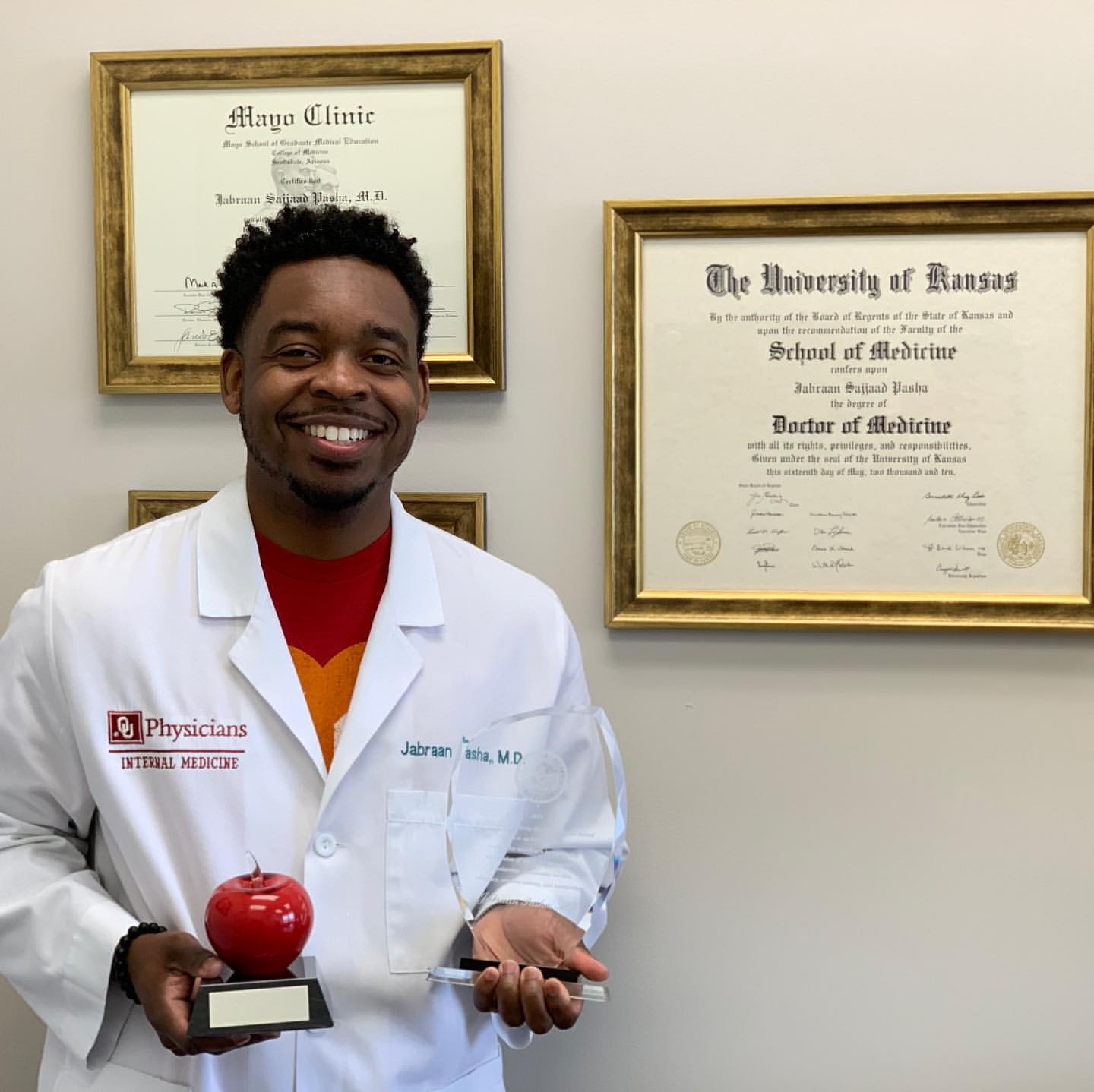
As a black male, he faced explicit biases constantly.
During his sophomore year at the University of Kansas, he got a taste of what he would later realize was implicit bias.
“I was trying to sell my books back after the semester was over. And the lady at the other counter said, ‘Football players sell your books over here,’” Pasha told Salud America!
At the time, he was offended. He saw this encounter as explicit bias.
Now, as an adult, he knows it was implicit bias.
“Blacks on campus/in college are [subconsciously assumed to be] athletes,” Pasha said.
What Really Is Implicit Bias?
Many studies have shown that physicians—especially white physicians—have implicit, subconscious preferences for white patients over those of color.
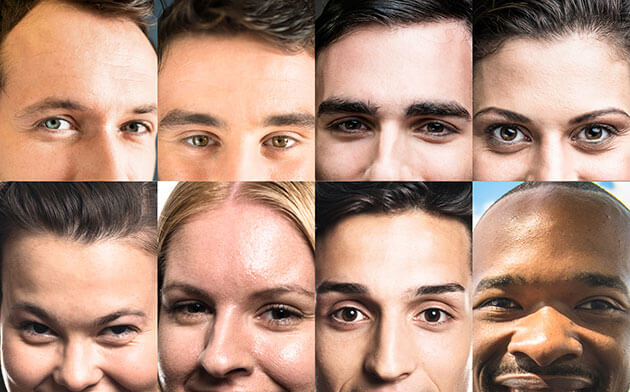 Implicit bias can lead to false assumptions and adverse health outcomes.
Implicit bias can lead to false assumptions and adverse health outcomes.
For example:
- Latino men are less likely to receive treatment for high-risk prostate cancer than White men.
- Latinas and other pregnant women of color face discrimination from healthcare providers. This is due not only due to their race, but also their socioeconomic status.
- White male doctors are less likely to prescribe pain medications to black patients than white patients.
- Minorities who visit an emergency room in the U.S. are less likely to receive prescriptions for certain medications than Whites.
“These biases, which encompass both favorable and unfavorable assessments, are activated involuntarily and without an individual’s awareness or intentional control,” according to the Kirwan Institute. “Residing deep in the subconscious, these biases are different from known biases that individuals may choose to conceal for social and/or political correctness. Rather, implicit biases are not accessible through introspection.”
Pasha Finds Implicit Bias in the Doctor’s Office
Pasha is helping to diversify the healthcare workforce.
He earned his medical degree from The University of Kansas School of Medicine. He completed his internal medicine residency training at Mayo Clinic Arizona. Now he is an associate program director for Internal Medicine Residency, and faculty director of student recruitment and pipeline programs at The University of Oklahoma School of Community Medicine.
Yet in the clinic, many patients assume he isn’t a doctor due to his skin color.
Pasha admits to his own implicit bias in the exam room.
“But I think [implicit biases] are inappropriate no matter what,” Pasha said.
Pasha decided to do something.
As he continued to study the impact of implicit bias on patient care and society, he had an idea to start a workshop on implicit bias.
A Workshop: ‘Unlocking Implicit Bias’
Implicit bias training has increasingly sprung up across the United States.
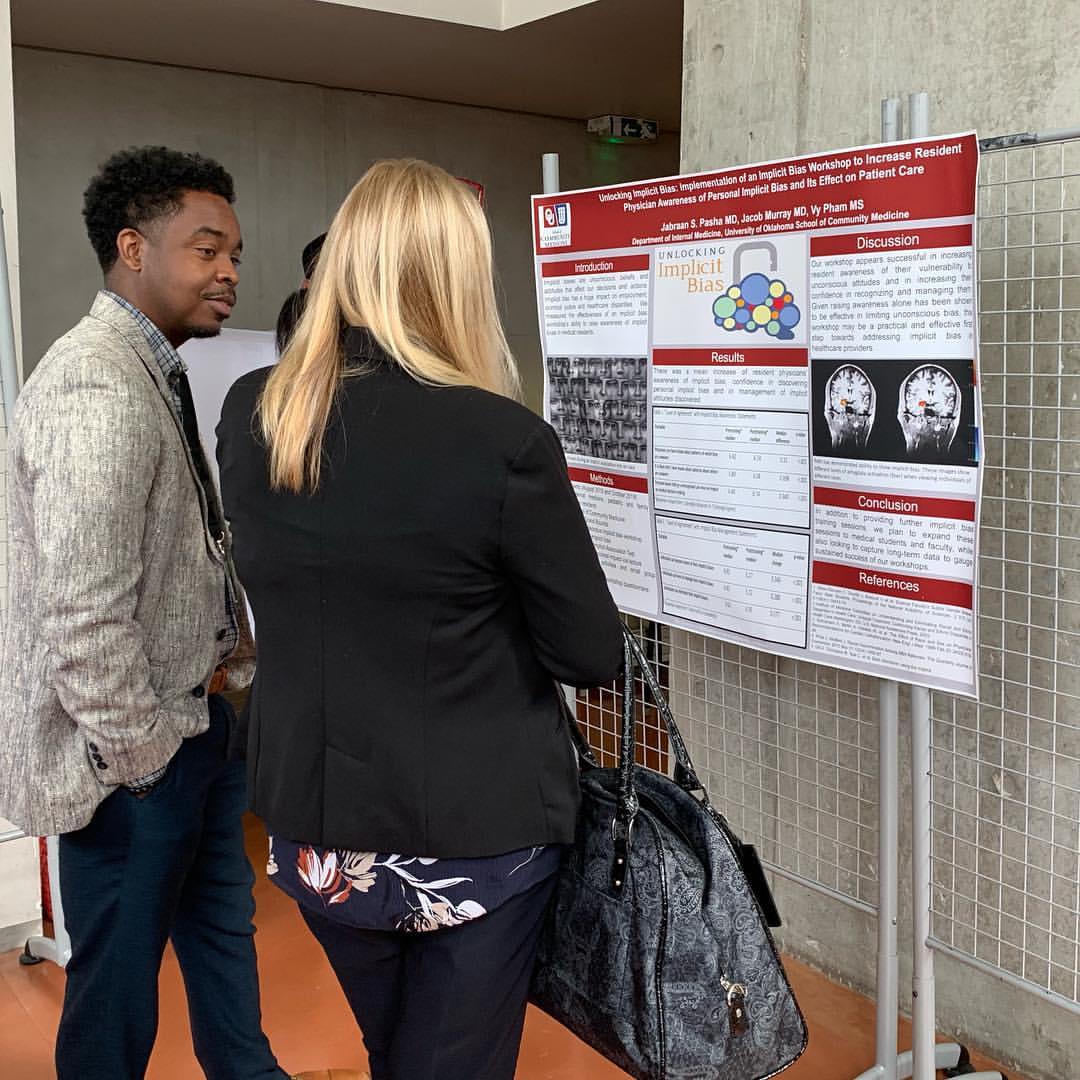
Police departments, businesses, and even schools are getting training to understand and overcome implicit biases.
“Implicit bias training is needed in all organizations because it is increasingly beneficial if it is taught with the proper amount of content, length of time, and audience,” according to The Training Associates. “Effective training enhances awareness as well as promotes organizations and strategic growth.”
Pasha took his idea and created a workshop to give the community an opportunity to gather to learn about implicit bias and its effect on people’s health.
The workshop, Unlocking Implicit Bias, is an engaging, practical learning experience that approaches implicit bias in a straightforward, compassionate, empathic, yet entertaining manner.
The workshop incorporates easy-going humor, poignant storytelling, events and trends from national headlines, and Pasha’s personal anecdotes.
“I try to create a platform about something that is difficult to talk about,” Pasha said. “Approaching these issues through a more positive lens allows for a more contrite and constructive forum.”
How ‘Unlocking Implicit Bias’ Works
In the workshop, Pasha facilitates large- and small-group activities on personal experiences with implicit bias in everyday life.
Then participants can begin to peel away the feelings of shame and guilt that many people associate with implicit bias.
This opens the door to begin to combat the negative effects of bias, Pasha said.
“After introducing participants to the landmark tool that can reveal unconscious attitudes, the Implicit Association Test, our attention is then focused on the evidence-base, where we demonstrate key findings from the substantial literature on the nature and effects of implicit bias on patient care,” Pasha said.
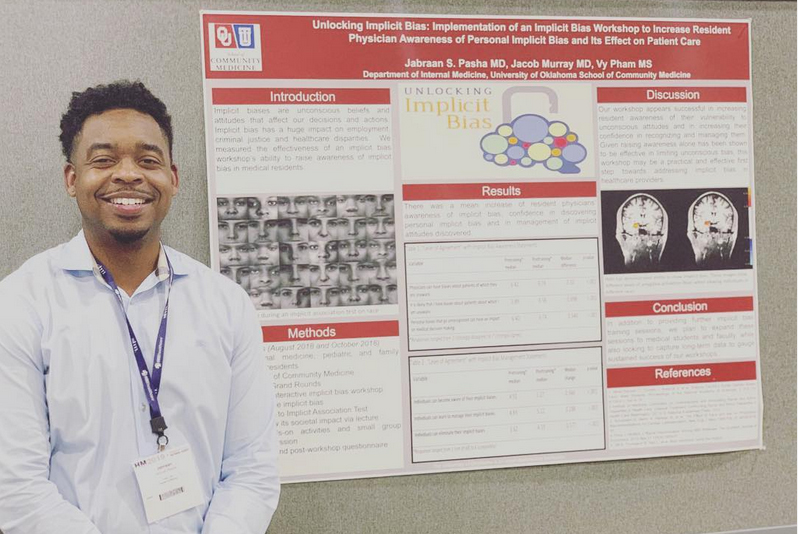
Ultimately, the workshop features a comprehensive discussion and brainstorming session to discuss proven methods to combat implicit bias. This gives participants skills to take to their institutions to make an immediate impact on social justice and health equity.
By the end of the activity, participants will:
• Understand implicit bias and its personal, professional and societal impact
• Recognize that we hold implicit biases that can affect patient care
• Formulate a personal list of methods to combat implicit bias
Pasha said workshop participants often leave with a sense of relief.
They now understand that even good people have unconscious attitudes that affect their decisions, and they feel empowered to overcome their own biases.
“We all have implicit biases in our makeup. Dr. Pasha’s workshop helps to understand this deep topic in a light-hearted way allowing acknowledgment to be the first step,” said Monica Basu, a senior program officer with the George Kaiser Family Foundation, in a review of the workshop.
What’s Next for ‘Unlocking Implicit Bias’?
Pasha has presented Unlocking Implicit Bias over 30 times, including sessions for the American Association of Medical Colleges, Mayo Clinic, and internationally in Paris, France and Porto, Portugal.
“[The workshop] has been very successful.” Dr. Pasha said.
Dr. Pasha hopes to share his work with other organizations!
“As a physician in academic medicine, my job is to teach,” said Dr. Pasha. “Teaching [about implicit biases] is making a greater impact than teaching clinical medicine.”
You can make a difference, too.
Download the free Salud America! “Find Out If You Have Implicit Bias and What to Do Next” Action Pack. This will guide you to see if you have implicit bias, reflect and learn from others who have overcome their own implicit bias, and encourage others to learn about implicit bias, too.
The Action Pack was created by Dr. Amelie G. Ramirez, director of Salud America! at UT Health San Antonio.
Explore More:
Overcoming Harmful BiasesBy The Numbers
3
Big Excuses
people use to justify discriminatory behavior
This success story was produced by Salud America! with support from the Robert Wood Johnson Foundation.
The stories are intended for educational and informative purposes. References to specific policymakers, individuals, schools, policies, or companies have been included solely to advance these purposes and do not constitute an endorsement, sponsorship, or recommendation. Stories are based on and told by real community members and are the opinions and views of the individuals whose stories are told. Organization and activities described were not supported by Salud America! or the Robert Wood Johnson Foundation and do not necessarily represent the views of Salud America! or the Robert Wood Johnson Foundation.



